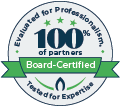- Business Planning
- Elder Law
- Estate Administration
- Estate Planning
- Guardianship
- Real Estate
- Special Needs Planning
The New Year is all about a fresh start. Along with starting a new diet and joining the gym, why not start 2016 off with an estate plan that works? This does not simply mean assessing whether or not you have estate planning in place. It also means ensuring the planning you do have is up to date and actually accomplishes your estate planning goals. Only about half of all Americans have planned for their disability and death. Of the fifty percent of people who have created estate plans most estate plans are only updated every 20 or so years. We believe your best practice is to review your estate planning every year and update your estate plan every 2-3 years so it remains consistent with changes in your life (personal and financial), changes in the law, changes in your attorney’s experience, and changes in your legacy. Make 2016 the year you adopt this philosophy as well!
In addition to reviewing your physical estate planning documents, the New Year is also a good time to assess what you own and determine if assets have been bought or sold which might impact your planning. Proper asset ownership is a critical piece to ensuring your estate planning works. Consider this relatively common scenario: you have a checking account, a savings account a retirement account and a house. All of the accounts and the house are owned jointly with your oldest child and your oldest child is the beneficiary of your retirement account. You also have a Last Will and Testament that says when you die everything you own is to be split equally between your three children. In this situation, when you do die, what do you think is going to happen? If you believe your oldest child gets everything and you have disinherited your other two children, you would be correct. Because your oldest child is the joint owner and beneficiary of all of your assets, she gets everything! This is true even though you have a Will that say something else and your intent is for all of your children to be equal beneficiaries of your estate. This is a perfect example of why reviewing what you own and how you own it is essential to the success of your estate planning.
Here is an asset checklist we suggest you review annually:
Real Estate, Mineral Rights and Water Rights
- Check the name(s) on the deed.
- Check how the property is owned (joint tenants with rights of survivorship, tenants by the entireties, etc.).
Checking, Savings and other Cash Accounts
- Check the name(s) on the account.
- Check how the account is owned (joint tenants with rights of survivorship, tenants by the entireties, etc.).
- Is there a Pay on Death (POD) beneficiary?
Securities and Securities Accounts
- Who is the security owner?
- Is there a Transfer on Death (TOD) beneficiary?
Insurance Policies
- Who is the insured?
- Who is the owner?
- Who is the primary beneficiary(ies)?
- Who is the contingent beneficiary(ies)?
IRA & Retirement Accounts
- Who is the owner of the account?
- Who is the primary beneficiary(ies)?
- Who is the contingent beneficiary(ies)?
Vehicles, Boats, Motor Homes, Mobile Homes, etc.
- Who is the titled owner(s)?
Business Interests
- What is the type of Entity?
- Tax status of entity?
- Type of interest held (shares, percentage ownership, etc.)?
- How is the interest owned?
At The Law Offices of Hoyt & Bryan we recommend our Estate Security Plan (ESP) Program. One of the benefits is an annual asset and funding review. The purpose of this review is to verify that any new assets you may have acquired are titled consistent with your estate planning (or intentionally inconsistent), so your estate planning works and accomplishes your planning goals.




